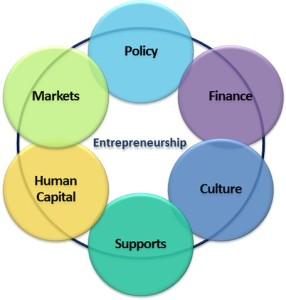Entrepreneurship Ecosystems cannot be created from the top down
Ecosystems … some love the word, some hate it. Its original definition is about a biological community of interacting organisms and their physical environment. More high school science lab than tech surely?
Yet more than ever before, industries are using the term ‘ecosystem’ to describe the landscape or community in which they work. This is particularly the case in innovation, entrepreneurship and tech. In this article, Lead Expert of Tech Revolution Alison Partridge, who is also a key figure in the London, UK tech scene, considers why ecosystems are important, the vital components of successful ecosystem and what we need to know about them to embrace this ‘new’ economy at city level.
This article also presents examples of what medium sized cities can do in this space, drawing heavily on the URBACT validated good practice from Barnsley which is now at the heart of the Transfer Network ‘TechRevolution’.
The pieces of the puzzle
Much has been written about Entrepreneurship Ecosystems. Perhaps one of the most interesting visual representations comes from Professor J Isenberg from Babson College, Boston who states that the key components to any successful Entrepreneur Ecosystem are policy, finance, culture, supports, human capital and markets as shown included in the diagram below:

This diagram has been used in many contexts, settings and places to review existing activity and identify gaps and challenges.
It’s used here to consider the role of the medium sized town or city within a tech entrepreneurship ecosystem, unpicking each of these components in turn. It draws upon the experience and practices of Barnsley, a former mining town in the north of the UK. After the shut down of the British coal industry in the 1980s, Barnsley lost in the region of 20,000 local jobs. Decades later, the legacy of pit closures lives on, with Barnsley’s unemployment rate remaining at 5.1% in 2019. At present, the economy is almost entirely made up of small and medium sized enterprises (SMEs), with private sector employment on the rise. Nevertheless, since the contraction of industry, there has been heavy reliance on the public sector for employment – with the government making up 21% of local employment. Creative, tech and digital industries are seen as potentially transformational sectors and the city has a clear aim to grow more and higher value jobs for local people.
For more than 10 years, Barnsley has been committed to growing these higher value jobs, particularly within its creative, tech and digital sectors.
The URBACT good practice comprises 2 main pillars:
- Enterprising Barnsley – a successful business support programme;
- The Digital Media Centre (DMC) – a landmark hub for creative and digital business in the town centre.
Through the success of these interlinked activities, the town has also been able to spin out a number of new initiatives and activities. Together these initiatives create around 1,500 jobs per year and every £1 of public sector investment helps to secure an additional £5.33 in private sector investment into the local economy – and an additional £0.96 of local tax revenue for the council.
Does that mean that Barnsley’s got a thriving entrepreneurship ecosystem?
Taking each of Isenberg’s components in turn we can consider what might be included under each heading and use the framework to highlight some of the key features of Barnsley’s good practice.
| What might be present in a city with a strong tech entrepreneurship ecosystem | Lessons from Barnsley | |
| Policy | There are clear local policies and programmes in place which help to create the conditions in which entrepreneurs can flourish.Thought leaders from all sectors are engaged in driving future policy. | Barnsley Council has a clear and public commitment to creating more and better jobs for local people.The Enterprising Barnsley approach gives local businesses a single point of contact (a Key Account Manager) to help them navigate around all council services. Where there are issues / blockages points with e.g. planning, the EB KAM aims to unblock |
| Markets | Startups have easy access to local, regional and international markets.There are early adopters who are prepared to take a risk. | Through Launchpad, startups use lean business model canvas methodologies to disaggregate their key markets.Through Enterprising Barnsley local businesses can access export advice.Where procurement allows, the Council includes local businesses in its supply chain, e.g. Julie who runs the coffee cart in the Digital Media Centre is a former beneficiary of Enterprising Barnsley.The Council works hard to try to link IoT startups coming through the IoT Tribe accelerator with local companies seeking IoT solutions. Within the Council itself, one team is considering using an app which monitors the use of its own hot desking areas. |
| Human Capital | There is a pool of local talent / skilled labour able to respond to the ever-changing needs of tech companiesEducation and training providers are flexible and responsive to the needs of tech startupsThere are opportunities for paid internships and apprenticeships within tech startups. | Through the TechTown Action Planning Network Barnsley ran a series of TechTown labs for young people at local schools and colleges.A lack of local talent is acknowledged as a key priority in the action plan itself. Education providers were engaged across the action planning process.Barnsley has developed a makerspace at Barnsley Library.It is developing a digital campus with ambitious plans to connect education providers at all levels with the local startup community. |
| Supports | There are open Workspaces such as incubators, accelerators, makerspaces, fablabs and co working spaces which are rooted in the local place and have a strong community offer.Entrepreneurs and startup can access the support that they need at the time that they need it in the way that they want it. | The Digital Media Centre is a flagship building at the heart of the town centre and acts as a magnet for the local digital community.It has a completely open-door policy and is buzzing with different community events and meet-upsThrough Enterprising Barnsley and the different offers within it, the startup and business support offer is pretty comprehensive and free at the point of provision. |
| Culture | Different ecosystem stakeholders cluster around a particular geographical location.Public and private spaces and places are conducive to chance meetings.There is a genuine ‘pay it forward’ mentality in the entrepreneurship community. | The DMC serves as a physical hub which brings the digital community together.The Council is honest about what is best left to others. It works hard to develop and maintain extensive relationships with other tech stakeholders within the region, across the UK and in other EU towns and cities.These links have helped it to bid for, and win, national and EU grants to support its ecosystem workThey have helped it to develop collaborative programmes e.g. with IoT Tribe (based in Madrid) and Capital Enterprise (based in London). |
| Finance | Entrepreneurs, startups and scale ups can find and access a wide range of finance opportunities including investment, debt, grant finance or simply contracts / sales. | The Enterprising Barnsley programme offers advice on local sources of finance.The Council is considering its own pre-seed co-investment vehicle as part of the Digital Campus plans. |
Is this enough?
The short answer (sorry) is ‘no’. Taken separately or together these different elements on their own will not be enough to grow a thriving digital community.
Why?
Because, ultimately, IT’S ALL ABOUT THE PEOPLE.
This is one of the core conclusions of the TechRevolution Transferability Study and something that cannot be emphasised too heavily – especially in the context of so many public funding programmes which continue to prioritise infrastructure projects.
The Transferability Study reflects upon some of the many success factors. When looking at this good practice through the lens of an ecosystem approach, the following factors are probably the most important:
● The integrated model of growth support provides an adaptable blueprint that can be varied, based on the local context of a city. The Enterprising Barnsley verticals of startup, growth, inward investment and business incubation are cut across by digital, and the physical presence of a landmark building – the Digital Media Centre – provides a focal point for this.
● A committed and passionate champion or leader is essential. In Barnsley, Tracey Johnson has been an inspiration, leading by example, ‘walking the talk’, and supported by both immediate management, as well as senior officers and politicians. She has a firm understanding of what might work and what will probably not work, backed up with first hand industry and entrepreneurial experience coupled with an ability to visualise what might be possible. She never stops asking questions of others and has the ability to take an ambitious idea from conception to inception rapidly.
● Linked to this Barnsley has demonstrated that trust won over time, that is backed up with evidence of what works and where the gaps are, provides the backdrop against which informed risks can be taken and (some) failure accepted. The integration of project management, customer relationships and income generation into the DMC is built on several years of developing and delivering effective business support.
● It is hard to over-state the importance of building networks, relationships and community
● Barnsley has adopted an iterative and agile approach, continually learning from others both nationally and internationally and building over time.
● To grow a tech ecosystem, it is important to find the ‘tech whiz’s’ in every community. In Barnsley’s case, they have worked really hard to help local people and businesses to see themselves in the ecosystem and take every opportunity to build collaborative and meaningful relationships which even the most ‘unusual’ of suspects.
● Despite being a medium sized town, Barnsley has made great efforts to be, and remain, connected with the cutting edge of tech, and has established high-level networks to benefit clients.
● Softer practices such as the ‘open door’ approach, coffee cart, pizza and beer events and ping-pong table with a lean, private sector mindset/methodology in teams are replicable and are unusual to see working at city administration level.
Barnsley’s good practice stands as a testament to the power of the people! Individual activities are crucial to a successful entrepreneur ecosystem, but their true potential can only be unleashed by the people and the communities that operate within that space.
So, can cities create entrepreneurship ecosystems?
The short answer is: it’s not possible.
Remember: YOU CANNOT CREATE AN ECOSYSTEM FROM THE TOP DOWN. You can only create the conditions in which an ecosystem can grow and flourish. The Barnsley experience goes some way to demonstrating that local authorities can – and do – have a role to play. Medium sized cities can take advantage of the human scale of their communities to engage people and businesses. Through TechRevolution, 6 other medium sized cities have an opportunity to find their place in their local entrepreneurship ecosystem and to test some of the different elements of the Barnsley good practice.
Perhaps that dictionary definition needs to evolve to reflect its use in common parlance which is pretty much any system or network of ever-changing interconnecting and interacting parts.
Alison Partridge is Lead Expert of TechRevolution. She also works at the heart of London’s entrepreneurship ecosystem, leading on OneTech which aims to change the face of startups.


